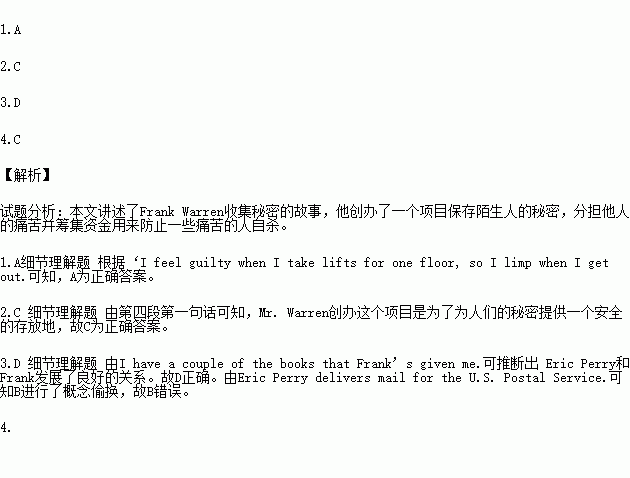题目内容
Some people collect stamps. Other people collect works of art or musical instruments. But a man in the American state of Maryland collects secrets.
For the past 10 years, people have been sending Frank Warren postcards and other objects with secrets written on them. He now has a million secrets. “It’s a drawing of a lift. And the secret says: ‘I feel guilty when I take lifts for one floor, so I limp when I get out.’” Frank said.
Ten years ago, Mr. Warren created an art project called PostSecret. People then began to send him postcards, other objects and emails telling their secrets. Every Sunday, he chooses 10 secrets and puts them on the website.
Mr. Warren says he created PostSecret so people could share their secrets in a safe place. “I was struggling with secrets in my own life. And it was by creating this safe place where others could share their secrets with me, I think that space was something I needed just as much as they did.”
He has published six books full of the secrets people have shared with him. One secret in each book is his. Eric Perry delivers mail for the U.S. Postal Service. He has brought thousands of secrets to Frank’s home over the past three years. “I have a couple of the books that Frank’s given me and I’ve read them all and my family has read them all and it’s wild!”
The project itself was once one of Frank’s secrets. His wife Jan didn’t know exactly what he was doing until the first book was published. The publisher told him that the address was going to be on the book, and he refused. However, the address was there just because of the contract between them. Actually Warren wasn’t very happy about that.
Some people tell Frank of their secret desire to kill themselves. So he and the PostSecret community have raised more than $1 million to help prevent suicides(自杀).
1.It is implied in Mr. Warren’s words in Paragraph 2 that ________.
A. the person was ashamed of using an elevator for one floor
B. Americans are not allowed to use an elevator for one floor
C. the person felt guilty when pretending to be a disabled one
D. he has received different secrets about using an elevator
2.Mr. Warren created PostSecret in order to ________.
A. satisfy his curiosity about others’ secrets
B. collect more materials for his series of books
C. offer a safe place for people to share their secrets
D. earn a lot of money by sharing others’ secrets online
3.What do we know about Eric Perry from the passage?
A. His family are eager to collect the books written by Frank.
B. His main job is to deliver mails and postcards for Frank.
C. He has been a postman who has a great many secrets.
D. He has developed a good relationship with Frank.
4.What was Mr. Warren’s secret according to the passage?
A. He once took the lift only for one floor.
B. He is interested in collecting others’ secrets.
C. He created an art project without telling his wife.
D. He helped prevent others from committing suicides.
 名校课堂系列答案
名校课堂系列答案
